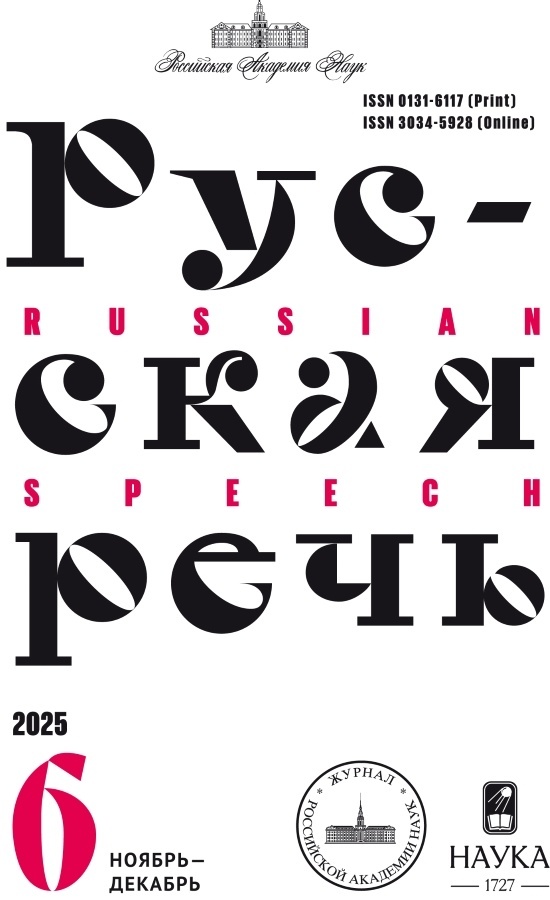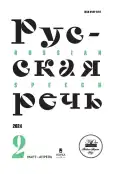Ambitious and Self-Sufficient, or the Change of Spiritual and Moral Paradigms
- Authors: Senko E.V.1
-
Affiliations:
- North Ossetian State University
- Issue: No 2 (2024)
- Pages: 52-64
- Section: Issues of Modern Russian Language
- URL: https://gynecology.orscience.ru/0131-6117/article/view/652441
- DOI: https://doi.org/10.31857/S0131611724020049
- ID: 652441
Abstract
Using the example of so-called fashionable words of the modern Russian language, the article examines the change in the meaning of vocabulary units that represent current fragments of the conceptual and pragmatic picture of the world. In connection with the ongoing process of globalization, the values of the Western world, often contrary to the national traditions of Russia, more and more often become fixed in Russian cultural and moral principles. The purpose of the article is to rethink the meaning of the words in the light of changes in Russian cultural and moral principles. It has been established that a perceived foreign concept is not always completely assimilated into the conceptual picture of the world of the recipient nation, remaining alien in relation to its specifics. In this regard, one can observe a kind of splitting of the meaning of the same words among different population groups of the same society. For example, different groups of speakers may attribute different evaluative meaning to these words. Thus, there is a conflict between the use of the word in a new meaning and traditional national images inherent in the Russian mentality. In turn, in a linguistic personality of a modern Russian person, who is aware of the traditional social ideal, but at the same time objectively fits into a new civilization, various contradictory ideas might clash together.
Full Text
About the authors
Elena V. Senko
North Ossetian State University
Author for correspondence.
Email: senkoelena@yandex.ru
Russian Federation, Vladikavkaz
References
- Alabugina Yu. V. Tolkovyi slovar’ russkogo yazyka s prilozheniyami [Explanatory dictionary of the Russian language with applications]. Moscow, AST Publ., 2016. 511 p.
- Apresyan Yu. D (ed). Aktivnyi slovar’ russkogo yazyka [Active Russian Dictionary]. Moscow, Yazyki Slavyanskoi Kul’tury Publ., 2014. Vol. 1. 408 p.
- Dal’ V. I. Tolkovyi slovar’ zhivogo velikorusskogo yazyka [Explanatory dictionary of the living Great Russian language]. Moscow, RIPOL Klassik Publ., 2006. Vol. 1. 752 p.
- Efremova T. F. Sovremennyi tolkovyi slovar’ russkogo yazyka [Modern explanatory dictionary of the Russian language]. Moscow, AST Publ., 2006. Vol. 1. 1168 p.; Vol. 3. 976 p.
- Entsiklopedicheskii slovar’ (2009) [Encyclopedic Dictionary (2009)]. Available at: https://niv.ru›doc/dictionary/encyclopedic/index.htm (accessed: 14.01.2023).
- Gerd A. S. (ed.). Bol’shoi akademicheskii slovar’ russkogo yazyka [Big academic dictionary of the Russian language]. Vol. 24. Moscow, St. Petersburg, Nauka Publ., 2017. 670 p.
- Hramcova N. L [Dynamic processes in pragmatically marked vocabulary in the Russian language at the beginning of the 21st century (using the example of the word ambitious)]. Vestnik Novosibirskogo gosudarstvennogo pedagogicheskogo universiteta. 2017, vol. 7, no. 2, pp. 143–158. (In Russ.)
- Ivanickaya A. Epoha samodostatochnosti: lyudi perestali byt’ nuzhnymi drug drugu [The era of self-sufficiency: people no longer need each other]. Available at: https://news.rambler.ru/tech/47094906-epoha-samodostatochnosti-lyudi-perestali-byt-nuzhnymi-drug-drugu/ (accessed: 14.01.2023). (In Russ.)
- Karasik V. I. Yazykovoi krug: lichnost’, koncepty, diskurs [Language circle: personality, concepts, discourse]. Moscow, GNOZIS Publ., 2004. 389 p.
- Kolesov V. V. “Zhizn’ proiskhodit ot slova…” [“Life comes from the word...”]. St. Petersburg, Zlatoust Publ.,1999. 386 p.
- Krongauz M. Russkii yazyk na grani nervnogo sryva [Russian language on the verge of a nervous breakdown]. Moscow, AST: CORPUS Publ., 2018. 512 p.
- Marinova E. V. [Can ambition be healthy?]. Russkaya rech’, 2012, no. 5, pp. 57–63. (In Russ.)
- Nahov I. M. Filosofiya kinikov [Cynic Philosophy]. Moscow, Nauka Publ., 1982. 223 p. Available at: https://avidreaders.ru›book/filosofiya-kinikov.html (accessed: 14.01.2023).
- Ozhegov S. I. Tolkovyi slovar’ russkogo yazyka [Explanatory Dictionary of the Russian language]. Ed. by L. I. Skvortsov. Moscow, Mir i Obrazovanie Publ., 2019. 1376 p. Available at: https://ibooks.ru/bookshelf/380010/reading (accessed: 14.01.2023).
- Ozhegov S. I. Slovar’ russkogo yazyka [Dictionary of the Russian language]. Ed. by S. P. Obnorsky. Moscow, State Publ. House of Foreign and National Dictionaries, 1949. 968 p.
- Shaklein V. M. [Civilizational evolution of the Russian language personality]. Materialy Mezhdunarodnoi nauchnoi konferencii “Yazyk kak Sistema I deyatel’nost’ — 3” [International scientific conference “Language as a system of ideas — 3”]. Rostov n/D, 2012, pp. 120–123.
- Shmelev A. D. [Russian language picture of the world: system shifts]. Mir russkogo slova, 2009, no. 4, pp. 14–21. (In Russ.)
- Shmelev A. D. [Russian literature in the context of world culture]. Materialy Mezhdunarodnoi nauchnoi konferencii ROPRYaL “Russkaya slovesnost’ v kontekste mirovoi kul’tury” [Proc. of the International scientific conference “Russian literature in the context of world culture”]. Nizhnii Novgorod, 2007, pp. 7–11. (In Russ.)








